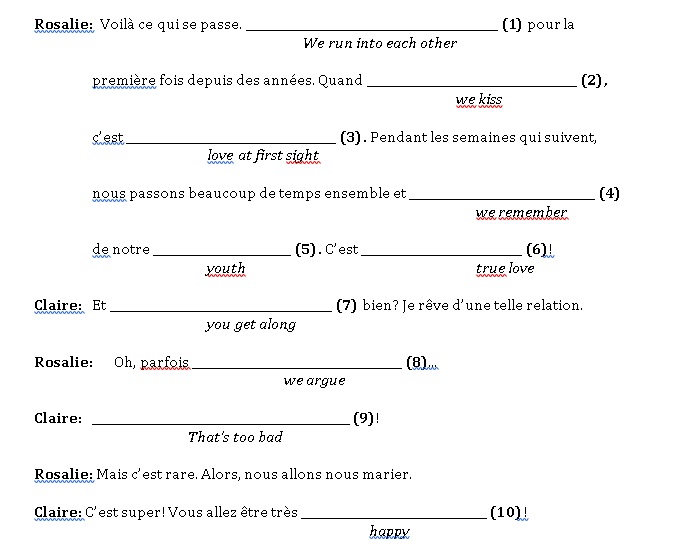Vous allez entendre Alice parler de son prochain voyage. Vous allez l’entendre deux fois. La première fois, écoutez pour comprendre le sens général. La deuxième fois, écoutez bien les détails et écrivez les mots qui manquent.
Je n’aime pas voyager ____________________1, donc cette année, Madeleine, Christian et moi partons ensemble dans leur voiture visiter le Languedoc, une région dans le sud de la France. Christian et Madeleine vont ____________________2 (même s’ils ____________________3 un peu trop vite pour moi sur ________________________4!) et moi, je vais payer l’essence quand on ____________________________5 à la station-service.
1. en avion 2. conduire 3. roulent 4. les autoroutes 5. fait le plein
You might also like to view...
When you gather sensory details for a narrative paragraph, what should you keep in mind?
A) Sights and sounds. B) Smells and tastes. C) Feelings like touch and smells. D) all of these.
Rosalie is talking to her friend Claire and is reliving her encounter with André. Complete their conversation as indicated. Use the present tense.

Fill in the blank(s) with the appropriate word(s).
Simon plays chess each day. His skills have greatly improved.
a) Simon plays chess each day so his skills have greatly improved. b) Simon plays chess each day, consequently, his skills have greatly improved. c) Simon plays chess each day; consequently, his skills have greatly improved. d) Simon plays chess each day, his skills have greatly improved.
One or two words in each sentence should be omitted or corrected. Write the word or words that should be omitted or the correction in the blank. Tom has created two amazing macaroni sculptures; it's difficult to say which one is most beautiful.?
Fill in the blank(s) with the appropriate word(s).